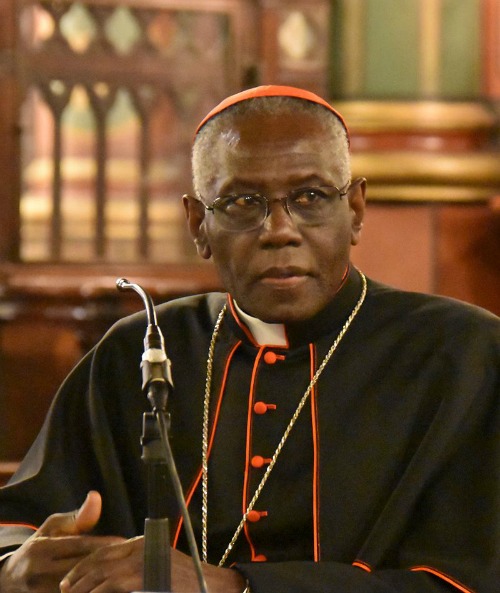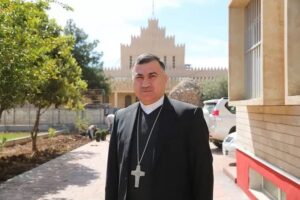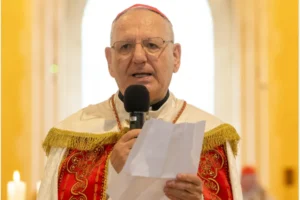Jeanne Smits, Paris correspondent
March 19, 2019 (LifeSiteNews) — In his latest book, Le soir approche et déjà le soir baisse (“It is nearly evening, and the day is almost over,” a quotation from the episode of the Emmaus pilgrims in Gospel of St. Luke), Cardinal Robert Sarah decided to “speak out” for the “disorientated Catholics” hurting from the deep crisis the Church is going through.
“I can no longer remain silent. I may no longer remain silent,” Cardinal Sarah wrote in his opening paragraph. He has taken full measure of the “dark night” of the Church and “She is wrapped and blinded by the mystery of iniquity.”
Days before the book’s release in France on March 20, its introduction was published online, giving a foretaste of a truly gripping text that tackles today’s problems head on: sexual abuse, but also doctrinal relativism, social activism and lack of prayer, false accusations of generalized homosexuality and hypocrisy, and the doubts of the faithful who see the Church’s enemies in its very midst.
Cardinal Sarah, prefect of the Congregation for Divine Worship and the Discipline of the Sacraments, offers no strategy, he says. Instead, he announces the timeless answers without which all efforts are useless – a deeply-rooted life of prayer, fidelity to the true teaching handed down by the Church rather than selling the Catholic doctrine short as “so many pastors” are doing, fraternal charity, and the love of Peter.
But his words are in no way a minimization of the ordeal the Church is going through.
Cardinal Sarah does not hesitate to speak – in the words of Pope Paul VI – of the “smoke of Satan” that has invaded the Church, openly designating the “traitors” who, like Judas Iscariot, have become “agents of the Evil one.” “They have sought to defile the pure souls of the littlest ones. They have humiliated the image of Christ present in each child,” at the same time humiliating and betraying so many faithful priests, he wrote.
“The Church is going through the mystery of the flagellation” at the hands of those “who should love and protect her,” warned Cardinal Sarah.
But the cause of the sexual abuse scandal, he added, can only be found in earlier betrayals: “The crisis which the clergy, the church and the world are going through is radically a spiritual crisis, a crisis of faith.”
The African cardinal recalls that the “mystery of Judas” – words borrowed from Pope Francis – resides in moving away from the teachings of Jesus, and can therefore be compared with the mystery of evil in our time.
“Jesus called him like all the apostles. Jesus loved him! He had sent him out to announce the Good News. But little by little, Judas’ heart was taken over by doubts. Imperceptibly, he started judging Jesus’ teaching. He said to himself: this Jesus is too demanding, and not efficient enough. Judas wanted to make the kingdom of God come on earth straightaway, through human means and according to his personal plans.” He stopped praying with Jesus and “sought refuge in the affairs of the world,” probably murmuring in his heart “I shall not serve” when Jesus washed his feet at the Last Supper, wrote Cardinal Sarah. “He received communion when his plans were already complete. It was the first sacrilegious communion of history. And he betrayed.”
According to Cardinal Sarah, the same faults, the same betrayals, are committed today: “We have abandoned prayer. The evil of efficient activism has infiltrated itself everywhere. We seek to imitate the organization of large companies. We forget that only prayer is the blood that can irrigate the heart of the church … He who does not pray has already betrayed. He is already prepared for every compromise with the world. He walks in the steps of Judas.”
The cardinal has harsh words for the abandonment of Catholic doctrine. This is where he sees the cause of the current sex-abuse scandals:
“We tolerate any calling into question. The Catholic doctrine is challenged, and in the name of self-styled intellectual postures, theologians take pleasure in deconstructing dogma and in emptying morals of their profound meaning. Relativism is the mask of Judas disguised as an intellectual. How can we be surprised that so many priests break their commitments? We downgrade the meaning of celibacy, we demand the right to a private life, which is the opposite of the priest’s mission. Some go so far as to claim the right to homosexual activity. One scandal follows another, involving priests and bishops.”
Cardinal Sarah goes on to warn his fellow priests that they will all be tainted by accusations that are true only for a minority. But “may your hearts not be troubled,” he added, recalling that Christ himself was taunted with the words “Crucify him!” and begging them not to be troubled by “biased research” that presents the pastors at the head of the Church as “irresponsible churchmen with an anemic interior life.”
“Priests, bishops and cardinals without morals will not in any way tarnish the luminous witness of more than 400,000 priests in the world who each day loyally, joyously and in a saintly manner serve the Lord. Despite the violence of the attacks that she weathers, the Church shall not die. That is the promise of the Lord, and her word is infallible.”
Specifically addressing those Catholics who are led to doubt, he spoke of Judas’ “subtle poison” of betrayal. The devil “wants us to see (the Church) as a human organization in crisis” when she is “Christ continuing Himself.” Satan pushes the faithful toward division and schism in “making us believe that the Church has betrayed.” “But the church does not betray. The church, full of sinners, is herself without sin. There will be always enough light in her for those who seek God.”
Cardinal Sarah warned faithful Catholics against the temptation of “wanting to take things into our own hands” – a temptation that would lead to division through criticism and ripping apart. “Let us not hesitate (…) to denounce sin by starting with our own.”
“I tremble at the idea that the seamless garment of Christ may once more be torn apart. Jesus suffered agony when seeing in advance the divisions of Christians. Let us not crucify Him anew,” the cardinal implored.
Cardinal Sarah is not seeking popularity or success, he insisted. “This book is the cry of my soul! It is a cry of love for God and for my brothers. I owe you, you Christians, the only truth that saves. The Church is dying because pastors are afraid to speak in all truth and clarity. We are afraid of the media, of public opinion, of our own brothers. The good pastor lays down his life for his sheep.”
As for confused Catholics whom he is addressing, Cardinal Sarah exhorted them, and especially priests, to prayer. “He who prays not damns himself,” he wrote, quoting St. Alphonsus. “It is not a question of accumulating devotions. It’s a question of being silent and adoring, of being on our knees, of entering with fear and respect into the liturgy. It is the work of God. It is not a theater.”
He goes on with his meditation: “Dear friends, do you want to put the Church back on its feet? Get on your knees! It’s the only way! If you do any differently, what you will do, will not be of God. (…) If we do not place our heads, in the way of St. John, on the heart of Christ, he will not have the strength to follow Him to the Cross. If we do not take the time to listen to the heartbeat of our God, we will abandon Him, we will betray Him as the apostles did themselves.”
Besides prayer, faithfulness to doctrine is necessary in the current crisis. Cardinal Sarah is clearly conscious of the reasons of today’s confusion. “How can we accept that bishops conferences contradict each other? Where confusion reigns, God cannot reside!” he wrote.
“The unity of faith supposes the unity of magisterium in space and in time. When a new teaching is given us, it should always be interpreted in coherence with the teaching that precedes it. If we introduce ruptures and revolutions, we break the unity that governs the holy Church through the centuries,” he insisted: “Those who loudly announce change and rupture are false prophets. They seek not the good of the herd.”
Fidelity to the truth means accepting the Cross, wrote Cardinal Sarah, adding that Christ requires that fidelity anew.
He looks us straight into the eyes and asks each of us: will you abandon me? Will you renounce teaching the faith in all its plenitude? Will you have the courage to preach my real presence in the Eucharist? Will you have the courage to call these young people to consecrated life? When you have the strength to say that without regular confession, sacramental communion risks losing its meaning? Will you have the audacity to recall the truth about the indissolubility of marriage? Will you have the charity to do the same for those who threaten to fault to you for doing so? Will you have the courage gently to invite the divorced and remarried to change their lives? Do you prefer success or will you follow me? Please God that with St. Peter we may answer, full of love and humility, ‘Lord, to whom shall we go? You have the words of eternal life’ (John 6:68).”
All this requires “the love of Peter,” wrote Cardinal Sarah: “The mystery of Peter is a mystery of faith. Jesus has chosen to confide his Church to a man. Lest we forget, he let this man betray him thrice in the face of all, before handing him the keys of his Church. We know that the bark of the Church has not been confided to a man because of his extraordinary abilities. But we know that this man would always be assisted by the divine Pastor in order to hold from the rule of the faith.”
This is the reason not to be afraid, he added, speaking of the “golden thread of the infallible decisions of pontiffs, successors of Peter” as opposed to the “black thread of the human and imperfect acts of Popes, successors of Simon,” in which we yet “feel the small needle guided by the invisible hand of God.”
In the same section of his introduction, Cardinal Sarah made clear that Catholics are not expected to be blind:
“Dear friends, your pastors are covered with faults and imperfections. But it is not in despising that you will build the unity of the Church. Do not be afraid to demand of them the Catholic faith, the sacraments of divine life. Remember the words of St. Augustine: ‘When Peter baptizes, it is Jesus who baptizes. But when Judas baptizes, it is still Jesus who baptizes!”
And he added: “If you think that your priests and bishops are not saints, be saints for them. Do penance, fast to repair the faults and cowardice. That is the only way to bear the burden of the other.”
The cardinal’s fourth exhortation is about “fraternal charity,” reflecting on the Church as a mother who opens her arms to us: “In her womb, nothing can threaten us. Christ has opened His arms once and for all on the Cross so that the Church can open hers to reconcile us with her, with God and among ourselves:” a call against the division that “persecutes Jesus.”
In short, Cardinal Sarah is calling on the faithful to recognize “the greatness and transcendence of God,” whom we should love unto death – the one condition that can allow us to hear the words spoken to St. Francis of Assisi: “Go and repair my Church.” Cardinal Sarah added: “Go, repair through your faith, your hope and your charity. Go and repair through your prayer and your fidelity. Thanks to you, my Church will once again become my home.”
These words were signed on February 22, during the sex abuse summit in the Vatican, at the moment when horrible accusations started piling up against the Church, especially against those of its members were most faithful to its timeless teaching.
https://www.lifesitenews.com/news/church-blinded-by-the-mystery-of-iniquity-cardinal-sarah-says-in-new-book















